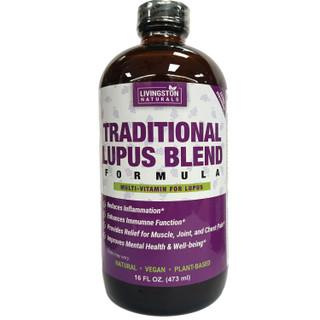Website designed with the B12 website builder. Create your own website today.
Start for free
Lupus is a complex autoimmune disease that can significantly impact a person's quality of life. Characterized by a wide range of symptoms, including joint pain, fatigue, skin rashes, and organ inflammation, it often poses challenges for both diagnosis and treatment. Traditional medical approaches typically focus on managing symptoms through medications and lifestyle modifications. However, many individuals are increasingly seeking alternative solutions, including herbal remedies, to address their health concerns and improve their overall well-being.
In this blog post, we will explore the potential of a Lupus Herbal Formula that aims to optimize health and alleviate the symptoms of this challenging condition. We will first provide a comprehensive overview of lupus, detailing its symptoms and conventional treatments. Next, we will delve into the world of herbal remedies, examining how natural cures can complement existing treatments and offer a new perspective on managing lupus. Finally, we will discuss how a specialized herbal formula can effectively ease symptoms and enhance the lives of those living with lupus, providing hope and healing through nature's offerings.
Understanding lupus: A guide to symptoms and conventional treatments
Lupus is a complex autoimmune disease that causes the immune system to mistakenly attack healthy tissues, leading to a range of symptoms. Common manifestations include fatigue, joint pain, skin rashes, and organ inflammation. While symptoms can vary widely from person to person, individuals often experience flare-ups that can last for days, weeks, or even longer. Early diagnosis is crucial for managing lupus effectively, as it allows healthcare providers to tailor treatment plans that can minimize symptoms and prevent complications.
Conventional treatments for lupus primarily involve immunosuppressive drugs, corticosteroids, and anti-inflammatory medications. These treatments aim to reduce the activity of the immune system, relieving symptoms and preventing damage to organs and tissues. However, these medications may come with side effects, prompting many patients to explore alternative options. By understanding lupus and its symptoms, individuals can take a proactive approach to their health, considering both conventional and herbal remedies in search of effective management strategies.
Herbal remedies: Exploring natural cures for lupus
Many individuals seeking relief from lupus symptoms turn to herbal remedies as a complementary approach to conventional treatments. While scientific research is still evolving, some herbs are believed to possess anti-inflammatory and immune-modulating properties that may help ease the discomfort associated with lupus. Ingredients such as turmeric, ginger, and green tea are rich in antioxidants and have shown potential in reducing inflammation. Additionally, herbs like ashwagandha and ginseng may support adrenal function and improve overall energy levels, which can be beneficial for managing fatigue—a common symptom of lupus.
When considering herbal remedies, it is essential to consult with a healthcare professional, especially for those already taking medications for lupus. Certain herbs can interact with conventional treatments, potentially diminishing their effectiveness or increasing the risk of side effects. Integrating herbal formulas into a comprehensive treatment plan can empower individuals to take control of their health while addressing the multifaceted nature of lupus symptoms. By exploring these natural options, many find they can enhance their quality of life and diminish the impact of the disease on their daily routine.
How an herbal formula can alleviate lupus symptoms effectively
Many individuals living with lupus seek alternative therapies to complement their conventional treatments and alleviate symptoms naturally. Herbal formulas, rich in anti-inflammatory and antioxidant properties, can play a crucial role in managing lupus symptoms. Ingredients such as turmeric, ginger, and green tea have gained attention for their potential to reduce inflammation and support immune function. These herbs work synergistically, providing relief from joint pain, fatigue, and skin rashes that often accompany lupus flare-ups. By incorporating an herbal formula into their daily routine, patients may find an effective way to improve their quality of life.
ve as a powerful ally in the ongoing battle against lupus, offering a holistic approach to healing.